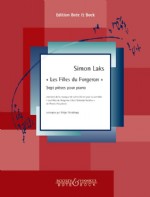Laks, Simon (Groschopp) - Les Filles du Forgeron
7 pieces for piano
Instrumentation: Piano
ISMN: 9790202538654
ISBN: 9783793145622
Publisher: Boosey & Hawkes / Bote & Bock
Level of Difficulty: Advanced
Contents |
|
| 1. « J’étais une jeune fille » | |
| 2. « Il neige sur les champs » | |
| 3. « Une fontaine » | |
| 4. Méditation | |
| 5. Enroulement de laine | |
| 6. L’Oiseau s’envole | |
| 7. « Je suis un petit marchand » | |

